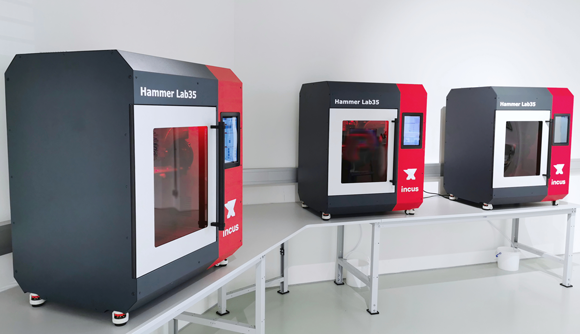Incus AM technology to be tested in project for producing spare parts in space
October 6, 2021

Incus GmbH, Vienna, Austria, has announced that it has partnered with the European Space Agency (ESA), OHB System AG, Bremen, Germany, and Lithoz GmbH, Vienna, Austria, on a collaborative project that aims to develop and test Additive Manufacturing in a micro-gravity environment. Incus provides lithography-based metal manufacturing (LMM) technology, defined as a vat photopolymerisation process (VPP) by ISO/ASTM, a process which is said to produce parts with excellent surface aesthetics and similar material properties found in Metal Injection Moulding (MIM).
One of the major challenges in maintaining a lunar station is ensuring a constant supply of goods. In addition to supplies, research materials and equipment, spare parts are also needed in the event of any failure of individual components. Since long-term missions have to be self-sufficient, space experts from the ESA have shown interest in the use and reuse of both existing lunar surface materials and recycling of lunar base materials, derived from production waste and end-of-life items. The ability to manufacture necessary items and spare parts, on board and on demand, will reportedly help to reduce the cost and volume of cargo missions from Earth, as well as minimise production waste.
The LMM technology is said to offer a potential solution as it can produce spare parts from recycled metal waste, which could enable the utilisation of recycled powders from scrap metals that are available on the moon. The LMM process uses a paste or suspension as feedstock and does not rely on the use of highly spherical gas atomised powders or support structures. The production of dimensionally accurate components separated by the thermal demoulding process does not require any time-consuming, mostly manual reworking, and is completely safe for the operator.
“We at Incus are excited to be a part of a project that will test the capabilities of our LMM technology for use in space,” commented Dr Gerald Mitteramskogler, Incus CEO. “Our solution could be a great fit to meet the challenging requirements of producing parts in such an environment.”
The goal of the eighteen-month project is to assess the feasibility of processing scrap metals available on the moon’s surface to produce a high-quality final product via a zero-waste process. The assessment will take into account the constraints of a space environment – for example, considering the potential contamination of the metal powder with lunar dust. Further evaluation of the influence of impurities on the sintering and result of the final microstructure will lead to optimisation of the binder quantity and type, as well as the development of a sustainable manufacturing chain in space.
Dr Martin Schwentenwein, Head of Material Development at Lithoz, stated, “Lithographic techniques such as the ones developed by Incus and Lithoz allow the combination of high precision 3D printing with high-performance metals and ceramics, while still remaining extremely resource-efficient. While these concepts have been successfully demonstrated on Earth, the activities of such projects are crucial for filling technological gaps and enabling the implementation of Additive Manufacturing in a space environment.”
Dr Martina Meisnar, Materials and Processes Engineer at ESA, added, “Out-of-Earth manufacturing is a very interesting topic that is being investigated by the European Space Agency with great effort. The goal is to refine these manufacturing concepts towards demonstration on Earth and ultimately for implementation in space.”
















